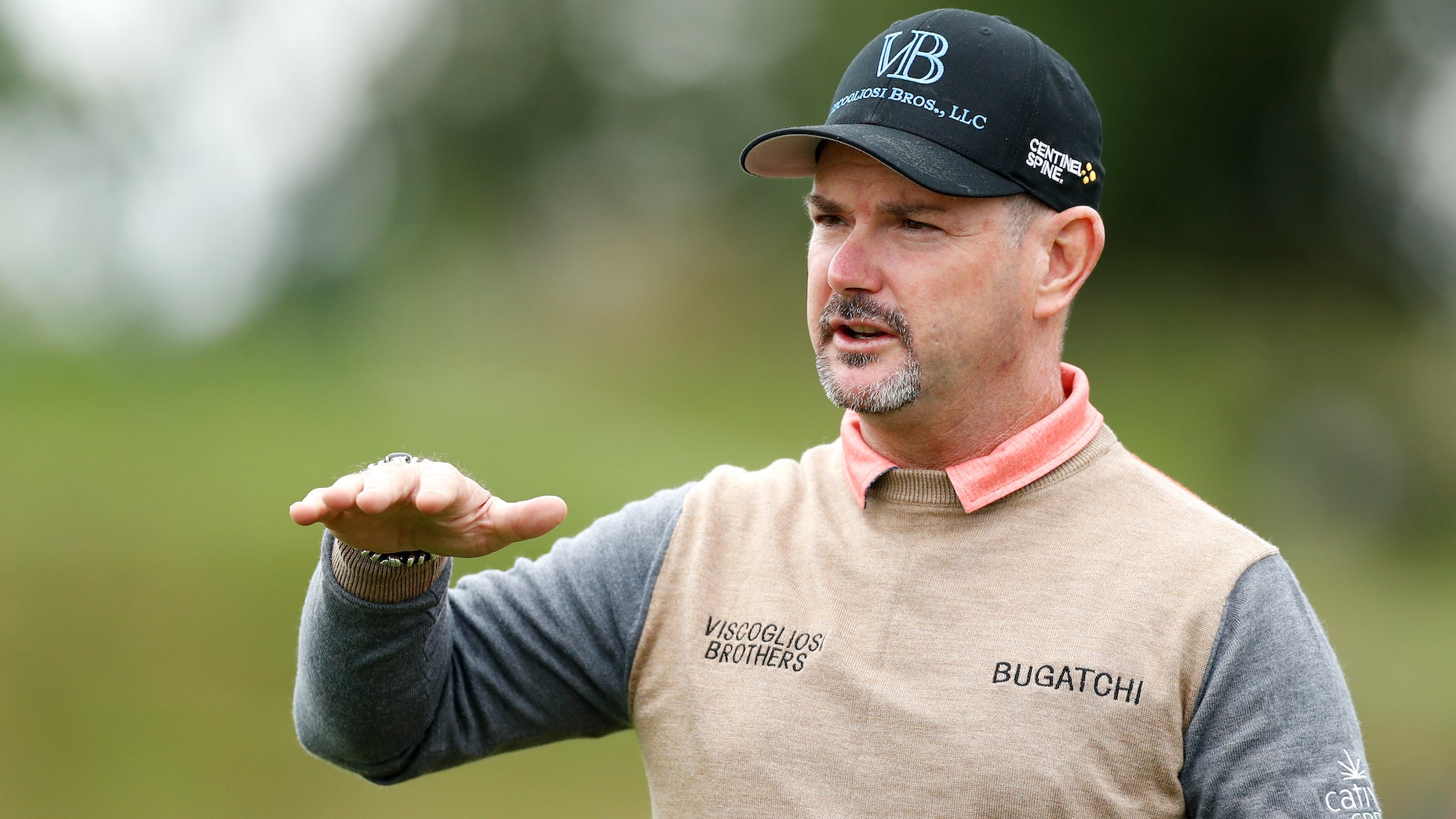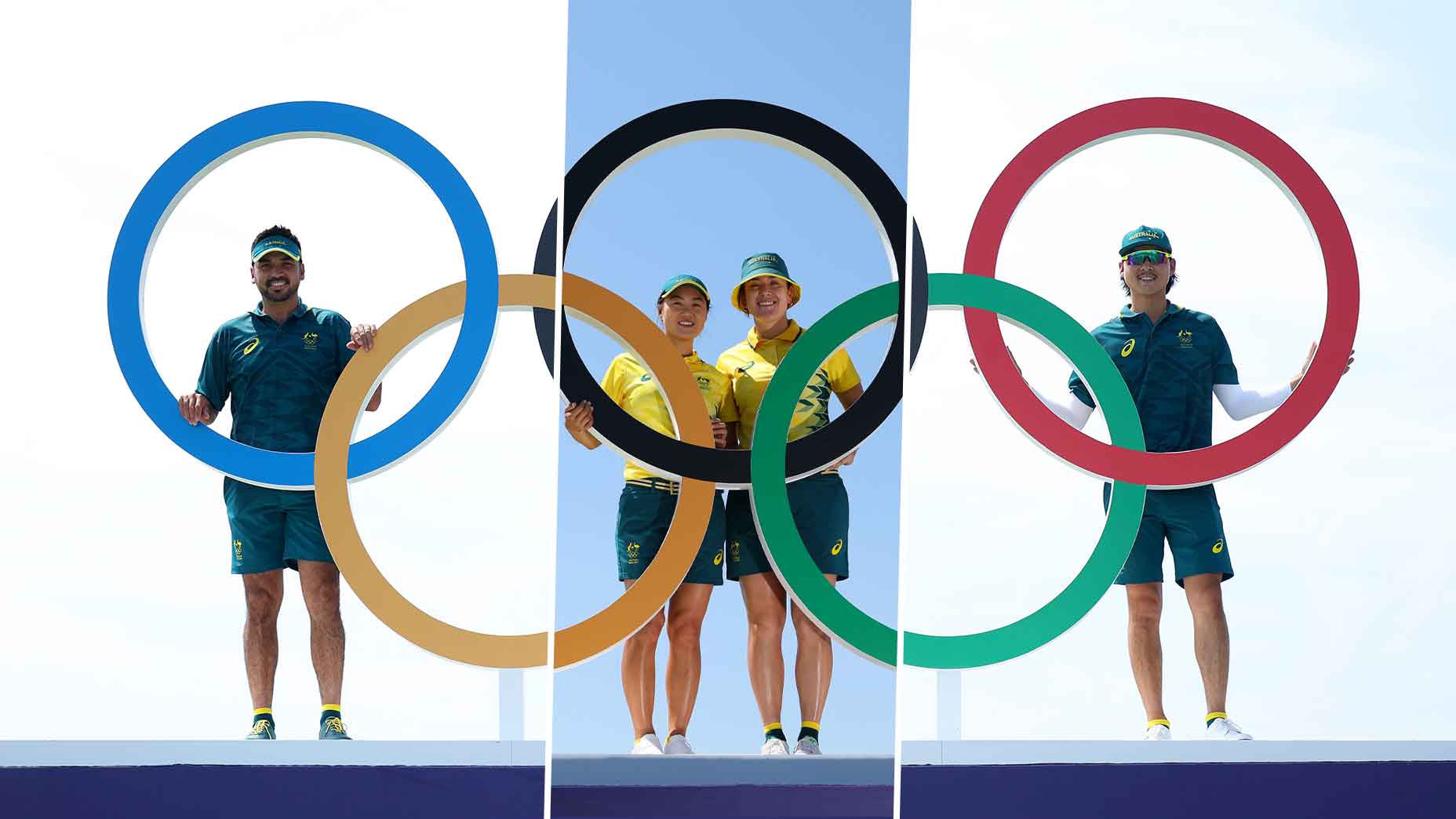Rory Sabbatini, the native South African golfer who lives in South Florida, is home for the holidays. He’s done for the year. He’s 45. He’s been a professional golfer for more than half his life. He’s never had a year like this one.
Sabbatini left one tournament with a shiny piece of metal attached to a ribbon. That is, his silver medal for his second-place finish in the Olympic golf tournament in Japan, where he represented Slovakia, his wife’s homeland.
The famously fast-swinging, fast-playing golfer left another golf tournament — last week’s RSM Classic in Sea Island, Ga. — with four shiny stickers on the face of his fairway wood.
That silver medal made Sabbatini a golfing legend in the short history of golf in Slovakia.
Rory Sabbatini was just DQ’d for a strange sticker violationBy: Dylan Dethier
That foursome of shiny stickers made Sabbatini another cautionary tale in the long history of odd PGA Tour rules debacles. Those four shiny stickers rendered one of his clubs, a fairway wood, as non-conforming and that led to him being DQed.
“I had these four little stickers on the club, three on the toe, one on the heel,” Sabbatini said in a phone interview on Monday. He used the club on the first hole. “One of my playing partners said, ‘Are you allowed to have those stickers on the club?’”
Sabbatini was playing with the veteran Colombian golfer Camilo Villegas and Doc Redman, the former Clemson golfer and the winner of the 2017 U.S. Amateur. Sabbatini declined to say which player brought up the issue with him.
“I said, ‘I don’t know, I’ll check when we get in,’” Sabbatini said.
The stickers, Sabbatini said, are something he and his instructor, Rick Smith, have been using in conjunction with Foresight Sports, a motion-detecting tracking system.
Sabbatini had been using the system in a pretournament practice session to get more information about precisely where his clubhead was at different points in his swing. He didn’t know the stickers had to come off before tournament play began.
Sabbatini said he did not believe he had ever played in an event with the stickers on his clubs before the Sea Island tournament.
“So we get in and I ask [Tour rules official] John Mutch if there’s a problem with the stickers, and he said he thought there was but he would check with the USGA to be sure,” Sabbatini said. “I never signed my card. And then he says, ‘Listen, there’s no way around it. It’s a non-conforming club.’ I could see he felt bad about it, but a rule is a rule.”
I wasn’t annoyed. I was highly disappointed. I had shot 68 and it was as if it never happened. Rory Sabbatini on his rules violation
And the penalty was the penalty: disqualification.
“I asked, ‘What’s the difference between these little stickers, which do nothing, and lead tape?’” Sabbatini said, describing his conversation with Mutch.
Mutch said that lead tape, used to add weight to a distinct part of the club, becomes an integral part of the club’s design.
You cannot, by the way, add lead tape to your clubhead during a round. Golf’s rule book attempts to cover everything. It doesn’t, but that is the goal.
The stickers, by the logic of the rules, are an example of something that could fundamentally change the playing characteristic of a conforming club. That these particular stickers, in the Sabbatini case, didn’t does not matter. Others could. Golf needs each rule to cover as many situations as possible and eliminate ambiguity and judgment calls when it can.
Sabbatini had violated a rule of golf. There is, per the Rules of Golf, no two-shots-per-infraction penalty, not in this situation, not anymore. Just this one harsh sentence from on high.
“I think it’s a pretty asinine rule, but it’s my own fault — I should have known,” Sabbatini said. “I wasn’t annoyed. I was highly disappointed. I had shot 68 and it was as if it never happened.”
What an end to his playing year. Still, what a year. Sabbatini was the oldest athlete to represent Slovakia at the Olympics this year. One teammate won a gold in women’s shooting, one won a silver in individual men’s canoeing and four won bronze medals in men’s team canoeing. There’s a lot of wilderness in landlocked Slovakia. Also, about two dozen golf courses.

Sabbatini’s silver medal is in his home in Boca Rotan, over his bar. At some point, it will be displayed in the pro shop at the Broken Sound Club, his home course in Boca, where the PGA Tour Champions has an annual stop.
“Winning the medal hasn’t changed my life,” Sabbatini said. Although he and his wife, Martina Stofanikova, did fly straight to Slovakia after the Olympics, where he got a reception the likes of which no Slovakian golfer before him ever did. That is, he got a reception, period. The first sentence of his Wikipedia entry now reads, “Rory Mario Trevor Sabbatini (born 2 April 1976) is a South African-Slovak professional golfer.”
Sabbatini said that as he winds down his playing career — “there’s been an awful lot of wear-and-tear to my body” — he would like to devote more time to trying to grow the game in Slovakia. He is clearly fond of his adopted motherland, which he described as a combination of rural upstate New York and mountainous Washington State.
Sabbatini has had a long, successful career loaded with interesting moments, some but not all of his own creation. At the 2007 Masters, he, Retief Goosen and Tiger Woods finished in a three-way tie for second, two shots behind Zach Johnson. Few golfers have played in as many as the same tournaments as Woods, or have shared as many RV lots near tournament sites with John Daly and Davis Love.
Sabbatini and Woods have never been anything like chums. What they share most is the trauma of ailing bodies. They both have a medical, and professional, relationship with Centinel Spine for their different and complex medical needs.
Why Rory Sabbatini’s unusual road to the Olympics could make him a national heroBy: Alan Bastable
Sabbatini said that his pain, before a surgical procedure performed by a Centinel Spine medical team, was so intense he was “eating Vicodin like they were Skittles.” He said his pain gave him an insight into the kind of pain Woods has endured in his career. He recalled the pressure of never knowing, one day to the next, if he’d be able to play. He recalled a tournament in Las Vegas where, after contending through 54 holes, he was unable to play the fourth round, because his body had “locked up.”
He said he looked at the single swing Woods posted Sunday night and deemed it “very impressive.” Only a fool, Sabbatini said, would bet against a Woods comeback. “It’s super-human, what he’s accomplished,” Sabbatini said. “What he’s done is what folklore is made of.”
But Sabbatini, in his own cheeky way, has contributed to the lore of the game, too, sometimes without doing a thing.
In March, in the third round at the Players, Jordan Spieth hit a wild tee shot that ricocheted off a tree before nearly hitting a player in the group ahead. A boom mic picked up Spieth’s commentary: “Is that Sabbatini? Oh, God. I couldn’t pick a worse person to hit into.” Spieth knew what he was talking about. Nobody would call Sabbatini mellow.
At the 2005 Booz Allen Classic outside Washington, D.C., Sabbatini had grown frustrated with the glacial playing pace of his fellow player, Ben Crane. On 17, Sabbatini simply completed a hole and moved to the 18th tee before Crane had even reached the 17th green. It was most unusual. Later, by statement, Sabbatini apologized for his breach of etiquette. He said that he and Crane would soon play a practice round together.
Fast-forward a dozen years, to 2017. Crane was playing in the first round of the Albertsons Boise Open, a Web.com event, when he received an eight-shot penalty, in keeping with the rules as they were written at the time. He described what happened, via Twitter. Here’s the text of it, in full:
“Had a new ‘that’s golf’ moment today. Was penalized 8 shots for having tiny stickers on two clubs (help launch monitors collect data).”
Sabbatini must have missed that tweet. But now he knows what Crane knows: Those stickers can get you.
Michael Bamberger welcomes your comments at Michael.Bamberger@Golf.com












